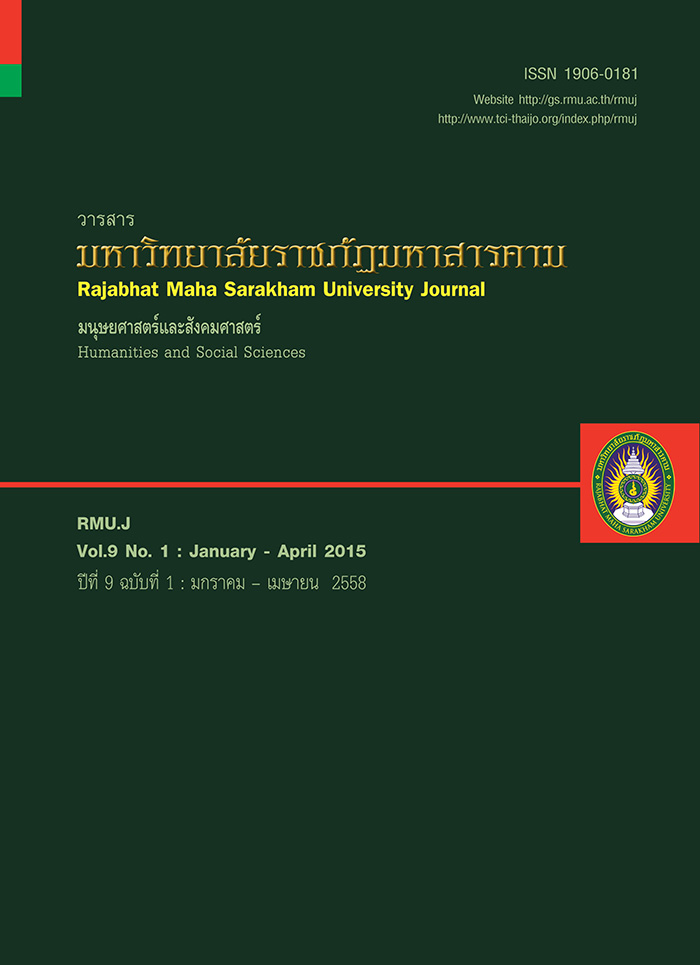การพัฒนาแผนการจัดการเรียนรู้แบบบูรณาการ เรื่อง ปรัชญาของเศรษฐกิจพอเพียง กลุ่มสาระการเรียนรู้สังคมศึกษา ศาสนา และวัฒนธรรม ชั้นประถมศึกษาปีที่ 6;Developing Integrated Learning Lesson Plans on the Topic of the Philosophy of Sufficiency Economy in the Learnin
Main Article Content
บทคัดย่อ
การวิจัยในครั้งนี้ มีวัตถุประสงค์ ประการแรก เพื่อพัฒนาแผนการจัดการเรียนรู้แบบบูรณาการ ที่มีประสิทธิภาพตามเกณฑ์
80/80 ประการที่สอง ศึกษาค่าดัชนีประสิทธิผลของการเรียนรู้แบบบูรณาการ ประการที่สาม เปรียบเทียบผลสัมฤทธิ์ทางการเรียนก่อน
เรียนกับหลังเรียน ประการที่สี่ ศึกษาพฤติกรรมการปฏิบัติตน ตามแนวทางปรัชญาของเศรษฐกิจพอเพียง และประการที่ห้า ศึกษาความ
พึงพอใจของนักเรียนต่อการเรียนรู้ แบบบูรณาการที่ผู้วิจัยพัฒนาขึ้น กลุ่มเป้าหมายเป็นนักเรียนชั้นประถมศึกษาปีที่ 6 โรงเรียนบ้านไส้
จ่ออำเภอกันทรวิชัย สังกัดสำนักงานเขตพื้นที่การศึกษาประถมศึกษามหาสารคามเขต 1 ภาคเรียนที่ 2 ปีการศึกษา 2555 จำนวน 18
คน เครื่องมือที่ใช้ในการวิจัย ได้แก่ แผนการจัดการเรียนรู้แบบบูรณาการ แบบทดสอบวัดผลสัมฤทธิ์ทางการเรียน แบบประเมิน
พฤติกรรมการปฏิบัตตนตามแนวทางปรัชญาของเศรษฐกิจพอเพียง และแบบสอบถามความพึงพอใจของนักเรียน สถิติที่ใช้ในการวิจัย
ได้แก่ ร้อยละ ค่าเฉลี่ย ส่วนเบี่ยงเบนมาตรฐาน และการทดสอบสมมติฐานโดยใช้การทดสอบค่าที t-test (Dependent Samples)
ผลการวิจัยพบว่า
1. แผนการจัดการเรียนรู้แบบบูรณาการ ชั้นประถมศึกษาปีที่ 6 มีประสิทธิภาพ ตามเกฑณ์ 83.39/83.89
2. ค่าดัชนีประสิทธิผลของการเรียนรู้โดยใช้แผนการจัดการเรียนรู้แบบบูรณาการ ชั้นประถมศึกษาปีที่ 6 มีค่าเท่ากับ 0.7551
หรือคิดเป็นร้อยละ 75.51
3. นักเรียนชั้นประถมศึกษาปีที่ 6 มีผลสัมฤทธิ์ทางการเรียนหลังเรียนด้วยแผนการจัดการเรียนรู้แบบบูรณาการสูงกว่าก่อน
เรียน อย่างมีนัยสำคัญทางสถิติที่ระดับ .01
4. นักเรียนมีพฤติกรรมการปฏิบัติตนตามแนวทางปรัชญาของเศรษฐกิจพอเพียง โดยรวมอยู่ในระดับมากที่สุด
5. นักเรียนมีความพึงพอใจต่อการเรียนรู้ด้วยแผนการจัดการเรียนรู้แบบบูรณาการ โดยรวมอยู่ในระดับมากที่สุด
The research aims 1) to develop integrated lesson plans based on the 80/80 standardized criterion
efficiency 2) to assess the effectiveness index of the integrated learning lesson plans, 3) to compare the
learning achievement before and after using the integrated lesson plans , 4) to investigate the students’
behavior according to the philosophy of Sufficiency Economy and 5) to survey the students’ satisfaction with
the integrated learning management developed by the reseacher. The target population was eighteen 6th
grade students of Ban Saijaw School, Kantarawichai District under the Office of Maha Sarakham Primary
Education Service Area 1 in the 2nd semester of the academic year 2012. The target group was selected by
the purposive random sampling method. The instruments used in the research were integrated lesson plans,
an achievement test, an evaluation form of the students’ behavior and a questionnaire. The statistics used
consisted of percentage, mean, standard deviation and the t-test (dependent sample) was used for hypothesis
testing.
The research results are as follows:
1. The efficiency index of the integrated lesson plans for the 6th grade students based on the
satdardized criteria was 83.39/83.89%.
2. The effectiveness index of the integrated lesson plans for the 6th Grade was 0.7551 or
75.51 %.
3. The average score of the post test of the students was significantly higher than that of the
pre-test score at the .01 level.
4. The overall behavior of the students’according to the philosophy of Sufficiency Economy rated
at a very high level.
5. The average level of the students’ satisfaction with the integrated lesson plans rated at a very
high level.
Article Details
1. บทความที่ลงตีพิมพ์ทุกเรื่องได้รับการตรวจทางวิชาการโดยผู้ประเมินอิสระ ผู้ทรงคุณวุฒิ (Peer Review) สาขาที่เกี่ยวข้อง อย่างน้อย 3 ท่าน ในรูปแบบ Double blind review
2. ข้อคิดเห็นใด ๆ ของบทความที่ลงตีพิมพ์ในวารสารมหาวิทยาลัยราชภัฏมหาสารคาม นี้เป็นของผู้เขียน คณะผู้จัดทำวารสารไม่จำเป็นต้องเห็นด้วย
3. กองบรรณาธิการวารสารมหาวิทยาลัยราชภัฏมหาสารคาม ไม่สงวนสิทธิ์การคัดลอกแต่ให้อ้างอิงแสดงที่มา


